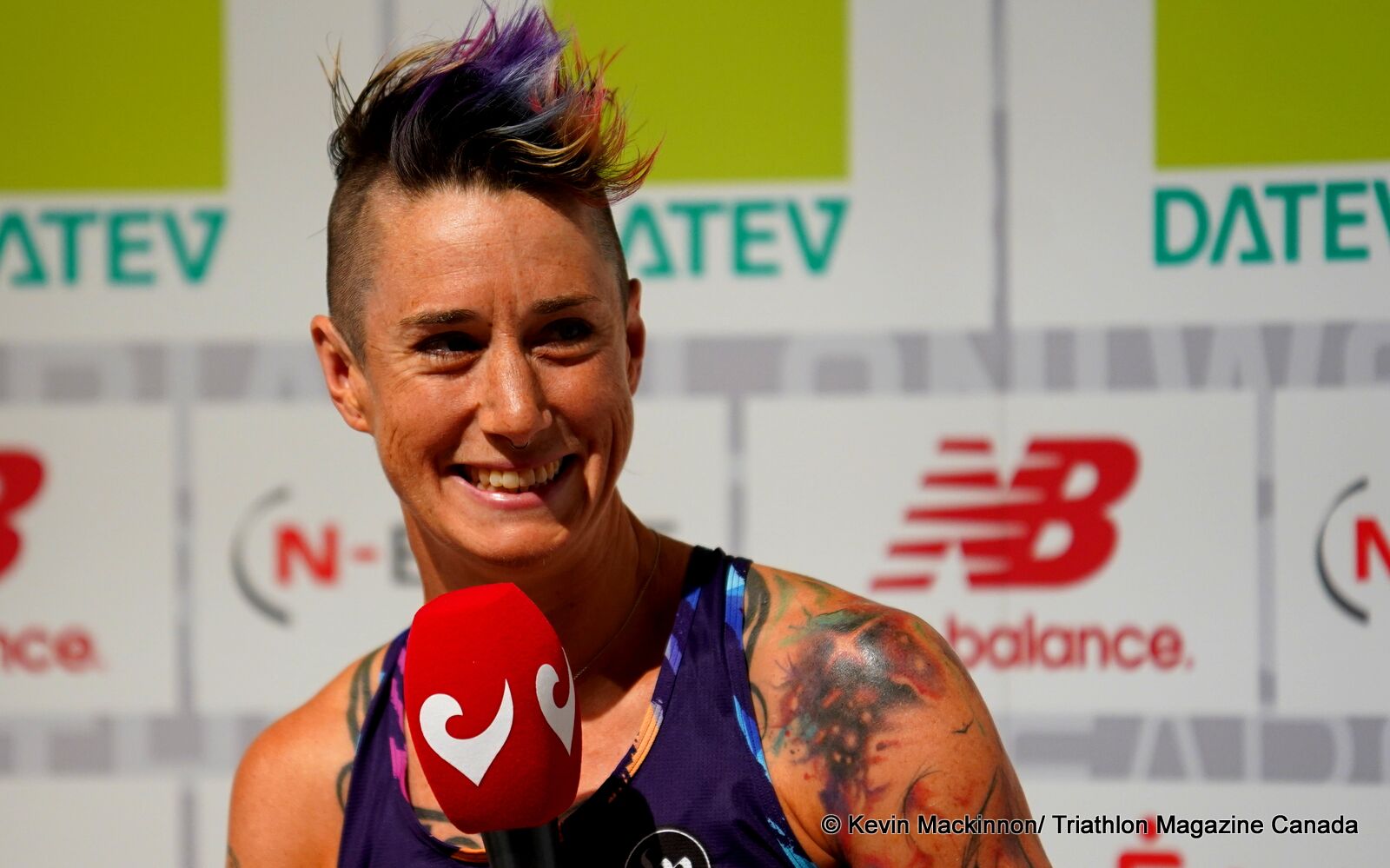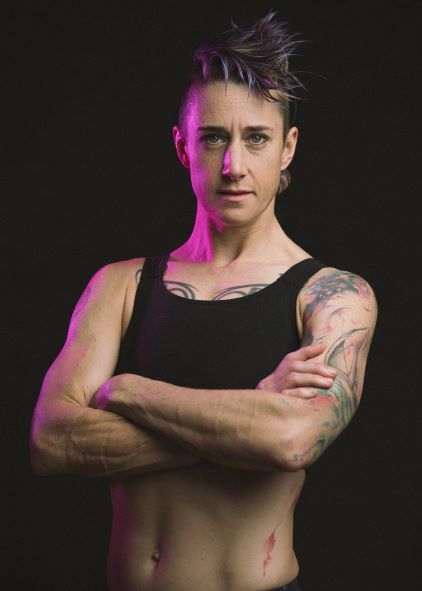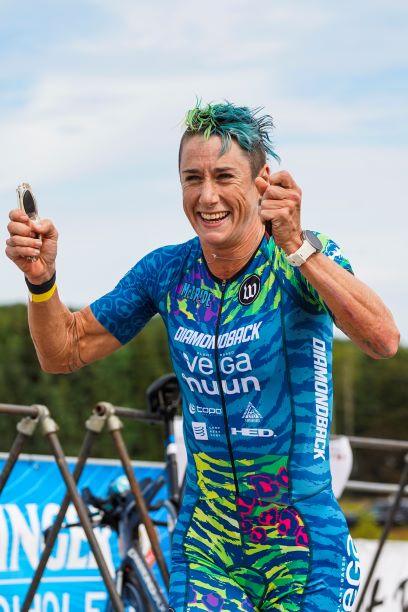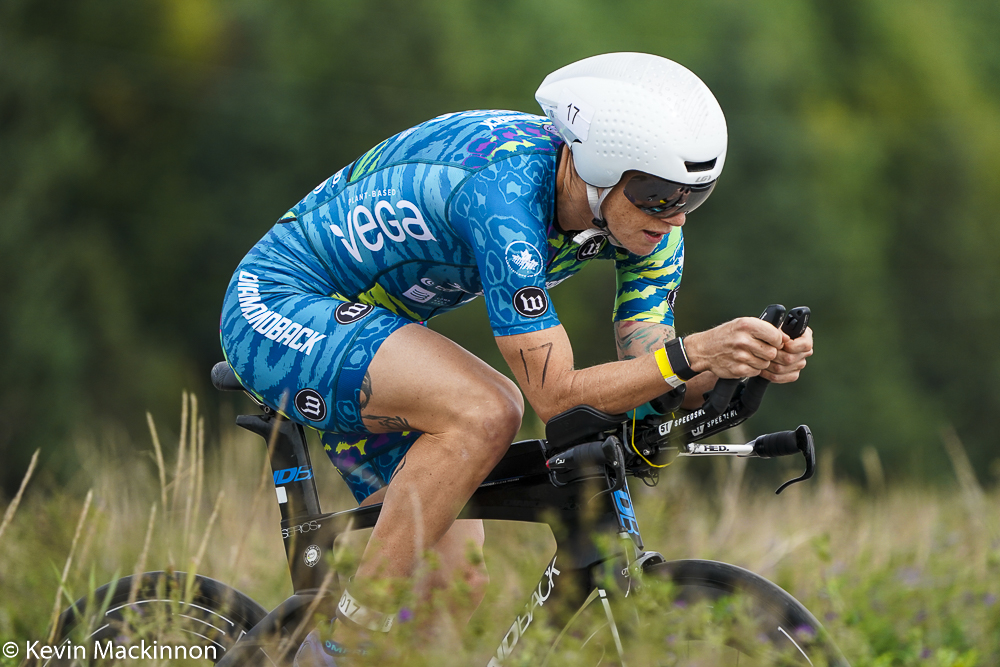Triathlon’s first gender non-binary pro: Rach McBride leads the way
Half-distance champion becomes the standard-bearer for athletes who feel marginalized and othered by the firmly drawn gender lines in sports
 Photo by:
Kevin Mackinnon
Photo by:
Kevin Mackinnon
Half cup oats plus boiling water. Add collagen, hemp hearts, pumpkin seeds. Toss in a handful of berries, plus walnuts or pecans. Drizzle with maple syrup and nut milk. Repeat each morning for two decades.
For someone who has scampered down three to four divergent career paths, with side roads into music, tattoos, cats, and fire-spinning, Rach McBride’s daily breakfast is remarkably consistent.
“I love good food, but right now in my life, food is my fuel, so the fewer decisions I have to make around that, the better off I am. It’s been 20 years since I’ve been eating oatmeal for breakfast and it hasn’t gotten boring.”
For McBride (they/them), boredom is always the enemy, and their life could have the appearance of chaos: The spikey lavender-dyed hair, the jumble of tattoos, a website spread of lush photography ranging from adrenaline-filled race photos to full-on fashion shots. Their wide-ranging list of accomplishments matches the visuals: three-time Ironman 70.3 champion (with nine fastest bike-course splits at that distance), the fastest bike splits at two Ironman events, winner of the Redbull 400, and first or second at every gravel race McBride has ever entered. Alongside those, add gigs as a classically trained cellist with two graduate degrees in genetics and a part-time role in sexual health education. Not boring.

For all the footholds in sport, science, and creativity, McBride isn’t flippant, isn’t chaotic, isn’t cavalier. In contrast to some elite athletes that post every workout and family event to their social feeds, McBride’s platforms (mainly Instagram @rachelmcb) are carefully curated, and much of their private life is just that, with one big exception.
It’s been a little over a year since Rach McBride came out publicly as the first gender non-binary professional triathlete, changing their pronouns to they/them, and beginning work as the standard-bearer for athletes who feel marginalized and othered by the firmly drawn gender lines in sports. It wasn’t something they did lightly. “I knew I was going to have to use a lot of energy to change pronouns and correct people – I still struggle with that. It took a lot of courage to do that just with friends and family, let alone put myself out there to colleagues and the public.”
Related: Rach McBride races the men at the Red Bull world championships
While “sex” refers to our male and female biology, “gender” is the social/culture term we use to express when people or things are what our society considers typically masculine or feminine. Sex is anatomy. Gender is cultural. The idea that both sex and gender are binary (everyone falls solidly into either a male or female box) is a product of our culture and social norms. Persons who are gender non-binary don’t consider themselves exclusively male or female, rather somewhere along the spectrum between the two.
The sporting world, of course, is traditionally binary. You tick a registration box as male or female, with results and awards similarly divided. But for individuals who don’t identify solidly as one or the other, sporting events can be disorienting, with the joy of competition dulled by a forced “ladies and gentlemen” norm, by pink and blue swim caps, by “All the Single Ladies” blasting for the female race start, but never for the men.
In the intervening year since McBride’s announcement, a series of seismic events forced the triathlon world (as well as this publication) to reckon with its policies and culture: the rise of the BLM movement, the subsequent implosion of Ironman’s Women for Tri Facebook group, and moves from dozens of states and municipalities in the United States to restrict participation of trans and non-binary persons in sports.
“I think everything that happened in 2020 rocked the face of the world, the world of diversity, equity and inclusion (DEI), and the world of triathlon. Then add the pandemic, which has allowed us – allowed me – to take the space and really digest what was going on, and realize I have a voice to use.”

McBride feels momentum in the air. “It feels to me that real change can occur, and there’s an acceleration where in the past it’s plateaued in terms of DEI questions. It’s affecting how athletes perceive themselves in the context of their sport, and the impact our sport can have on communities and the companies that are involved. Our population of athletes can really start to make a difference in terms of that inclusion piece, in terms of having more open minds and eyes to the pros and cons, the pluses and minuses in our sport.”
With almost no races in the last year, event directors have also had an opportunity to examine their roles in DEI, with many reaching out to McBride with ideas, eager to create a more welcoming environment for all. McBride recalls a gravel race where the race director simply provided a blank line for gender and allowed participants to choose to register for the men’s event or the women’s event. McBride has coached organizers to reconsider gendered language in communications and announcements, to offer “open” categories free of any gender designation and using an individual’s pronouns. McBride does think we have more exploration to do when prize money and elite status is involved. For example, until more non-binary athletes start competing, there likely would not be enough to fill a pro-level “open” category, so for now, triathletes competing for prize money and status points should race in whatever category they qualify for (which can vary depending on country and governing body).
These interactions – being asked and heard by decisionmakers in sports – fuel McBride’s optimism. “It’s a butterfly effect. The small steps I can take right now are like a stone thrown in a lake – with ripples that continue to travel. And if we have more stones thrown in, and more folks that feel comfortable being themselves and being out there, that’s huge.”
And how do they feel about forever being referenced as “non-binary professional triathlete Rach McBride” in every article, every media appearance, every interview?
“I love it! I would much rather be recognized as a non-binary person than a triathlete. Because to me, I think that visibility is incredibly important. It’s taken a lot of courage to come out and have these conversations, and I think if I can be the courageous one now, do this work now, it’s going to be so much easier for other people.”

The path to “Rach McBride, athlete and thought leader” was not linear. Born in the US Pacific Northwest to a Canadian doctor and nurse, the McBride family spent a decade in the Seattle area, following career paths in medical research to Cincinnati, Kansas City, and New Jersey before settling in Germany, where Rach spent the bulk of their teenage years.
Rach’s parents raised their kids to be open-minded, follow their interests and dive into new things. Rach learned the piano starting at age five, and the cello at nine (their mother still plays the piano, their father an accomplished trumpeter). They were a competitive swimmer until age 11, and by 16 had strapped on equestrian boots to compete in show jumping, all while maintaining top classroom scores. They enjoyed all of it, which didn’t make choosing a career easy.
“I really struggled early in my adult life trying to figure out what I wanted to do. I went to university to study veterinary but got sidetracked. I was all over the place and felt like I wasn’t making informed decisions, just flying by the seat of my pants. When I committed to earning my first master’s degree, it was exciting at first, but I quickly realized being a real scientist wasn’t what I wanted to do, I didn’t have the passion. At the same time, I didn’t understand what that kind of ‘passion’ felt like – until I found sport.”
While earning that first master’s degree in genetics, during a frigid Ottawa winter, McBride began training for the Berlin marathon, finishing fast enough to qualify for Boston. One of their running mentors at the time remarked that Rach might have a talent for triathlon; they had a swimming background, was already running, and had always enjoyed commuting on their bike. And for the first time in their adult life, at that first triathlon in Vancouver, they found the passion they’d been seeking. (McBride finished second overall at that first event, thank you very much.) As with most newbies, triathlon was, at first, just an expensive hobby, but as their training began to pay off, they had the opportunity to make their triathlon passion their career.
Yet even after discovering their joy as an elite triathlete, something wasn’t right.
Even as a child, McBride felt “weird.” “I was an androgynous kid, constantly being asked if I was a boy or a girl, but I didn’t have the language to say, ‘I’m neither.” They recall getting their ears pierced to help quell the questions.
“I would show up at a starting line and feel really out of place, but I didn’t know why.” Only now, in their early 40s has McBride discovered the language to express what they have felt all along. Coming out to their parents as non-binary—identifying as neither male nor female—their family was not surprised; they’d just been waiting for their kid to figure it out for themselves. “The first time my family used they/them with me, it was a feeling like nothing I’d ever experienced; it was so affirming. It just feels like who I am.”
Today, McBride is focused firmly forward. They continue to spread the word as a vocal advocate for diversity, equity and inclusion, particularly along gender lines. Their part-time work as an educator for Options for Sexual Health feeds the science side of their brain, while the occasional cello gig keeps their musical side fulfilled. But triathlon remains their passion for the foreseeable future.
What will 2021 bring for this Canadian tri superstar? “I have races I’m tracking every weekend on the radar, but what’s going to happen? I have no idea.” The pros are in the same boat as every other triathlete, not quite sure which events will proceed, and which may not.
McBride is on the start list for Unbound Gravel, the most prestigious gravel race in the United States in early June, but McBride isn’t sure that one is in the cards, much as they’d like to do it. Other than local events, the Purple Tiger (McBride’s nickname and spirit animal), looks towards Challenge Roth in early September, where they hope to follow last year’s 9:06:47 sixth-place finish with a sub-9 time. Then five weeks later, McBride is set to toe the line at the Ironman World Championship in Kona.
Can they pull off top finishes at both within five weeks? McBride is confident. “Roth is a really special place and I definitely want to really be ready. And for Kona, I’ll have a good amount of recovery time but still have a lot of fitness from Roth. I won’t be tired from doing a whole bunch of Ironman races during the season. I have full confidence that I can pull off a good race in Kona as well as Roth.
The back up plan if Challenge Roth doesn’t happen? The four-day TransRockies Gravel Royale stage race in late August.
So while the 2021 season is still somewhat uncertain, McBride has no plan to slow down, continuing to speak and fight for marginalized athletes, and continuing to stretch as an athlete. For Rach McBride, it’s ‘game on.’ Right after that morning oatmeal.
Christine Frietchen is a Kansas-based writer, triathlete, certified race official, and certified race director.
This story appears in the May issue of Triathlon Magazine Canada, available on newsstands now and digitally at on AppleNews+, Zinio, Nook, iTunes, Press Display and Press reader.
